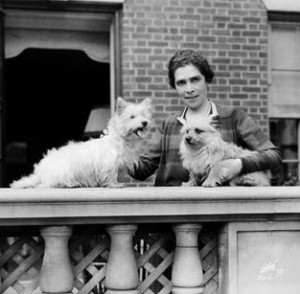Virginia C. Gildersleeve (1877 – 1965)
[From McCaughey entry in DAB, 1981.
Gildersleeve, Virginia Crocheron (Oct. 3, 1877 – July 7, 1965), college dean, was born in New York City, the daughter of Henry Alger Gildersleeve, a judge, and of Virginia Crocheron. She grew up in comfortable circumstances. “We were not ‘in society’ exactly,” she later wrote, “we were professional people.” She never married, and lived with her parents until their deaths in 1923. Gildersleeve graduated from the Brearley School in New York City in 1895, then entered Barnard College, the undergraduate women’s college within Columbia University. Her teachers included James Harvey Robinson, Franklin Giddings, and Nicholas Murray Butler. She graduated with the B.A. in 1899, first in her class and president of it.
A graduate fellowship and the lack of alternative plans kept Gildersleeve at Columbia, first as an M.A. student in medieval history and then as a doctoral candidate in English literature. She began teaching at Barnard in 1904, and by 1908, when she received the Ph.D. for her dissertation “Government Regulation of Elizabethan Drama,” she held a regular appointment in the Columbia English department and was teaching at the graduate level. Two years later, with her prospects for securing a permanent place at Columbia seemingly bright (she always insisted that she detected no prejudice against female professors among her male colleagues), Gildersleeve was asked by Columbia’s president, Nicholas Murray Butler, to set aside her promising scholarly career and become dean of Barnard College. Initially she was dubious about Butler’s motives in recommending her, at age thirty-three, to replace Laura Gill, who saw Barnard’s independence threatened by Columbia at every turn. But she accepted the offer and assumed the post in 1911.
During her thirty-six years as dean, Barnard’s relations with Columbia were close and cordial, in large part because Gildersleeve consulted regularly with President Butler, and also because she so penetrated the administrative command structure of Columbia that she was able to keep most proposals prejudicial to Barnard from surfacing. The college’s finances were also improved during the 1920’s; Barnard survived the Great Depression with only a modest retrenchment. Under Gildersleeve the Barnard faculty provided instruction for a growing number of profession-motivated undergraduate women and contributed significantly to the scholarly standing of Columbia. In some quarters she was criticized for her practice of hiring mostly women for junior faculty positions, while reserving most senior positions, which required Columbia approval, for men from outside. “Perhaps this was discrimination against women,” she later allowed, “but it was, I am sure, for the good of the college as a whole.” Hers was the feminism of the institutional insider.
Early in her deanship Gildersleeve escaped what she called the “hen with one chicken” outlook by venturing into public affairs. During World War I she coordinated activities of several women’s war work organizations, including the Women’s Land Army. She spoke on behalf of the League to Enforce Peace and, later, for the League of Nations Association. In 1919, with Bryn Mawr president Martha Carey Thomas, she helped organize the International Federation of University Women, through which she came to know many of Europe’s most accomplished women. Among them was Caroline Spurgeon, professor of English at the University of London, with whom she spent her summers in England throughout the interwar years.
Gildersleeve was involved during the 1920’s with several American Protestant educational efforts in the Middle East; in the process she became an anti-Zionist. She opposed the creation of Israel after World War II as “contrary to the national interests, military, strategic and commercial, as well as to common sense.” Such outspokenness offended some of Barnard’s Jewish trustees, just as her campaigning for Al Smith and for Franklin D. Roosevelt must have put off some of the college’s Republican benefactors.
Her internationalism was not of the pacifist variety. In 1940, incensed by the German air assault on her beloved England, Gildersleeve joined the Committee to Defend America by Aiding the Allies. With American entry into World War II, she helped bring a women’s naval reserve, the WAVES, into being. In February 1945 she was appointed by President Roosevelt as one of six American delegates–the only woman–to the conference to draft the Charter of the United Nations. Both at the preliminary meetings of the American delegation at Dumbarton Oaks and in San Francisco, Gildersleeve, as conspicuous for her elaborate hats and startling dark eyes as for her gender, influenced both the phrasing of the charter’s preamble and the substance of what became UNESCO.
Having broached the subject of retirement in 1941, only to be rebuffed by the seventy-nine-year-old Butler, Gildersleeve secured her release from the Barnard trustees in 1946. She and Elizabeth Reynard, a Barnard English instructor with whom she had worked in connection with the WAVES and who had accompanied her to San Francisco, then took up residence in Bedford, N.Y., where she wrote her memoirs, Many a Good Crusade (1954), and a collection of magazine articles entitled A Hoard for Winter (1962). After the death of her companion in 1962, Gildersleeve entered a nursing home in Centerville, Mass., where she died. She might have, she wrote in retirement, combined her more-than-ample responsibilities as an academic administrator with gardening or breeding terriers, but chose instead “to have lived fully in the main events of my times, making some effort to grapple with our most vital problems.”
Further Readings
[Gildersleeve’s papers are in Special Collections, Columbia University. See Annie Nathan Meyer, Barnard Beginnings (1935); Alice Duer Miller, Barnard College: The First Fifty Years (1939); and Robert A. Divine, Second Chance (1967). An obituary is in the New York Times, July 9, 1965.]
Source Citation
“Virginia Crocheron Gildersleeve.” Dictionary of American Biography. New York: Charles Scribner’s Sons, 1981. Biography in Context. Web. 9 Dec. 2013.
See “Who’s Afraid of Virginia Gildersleeve?: Notes for a Biography”
